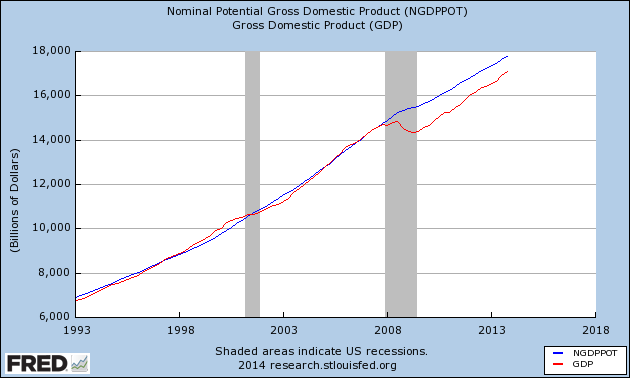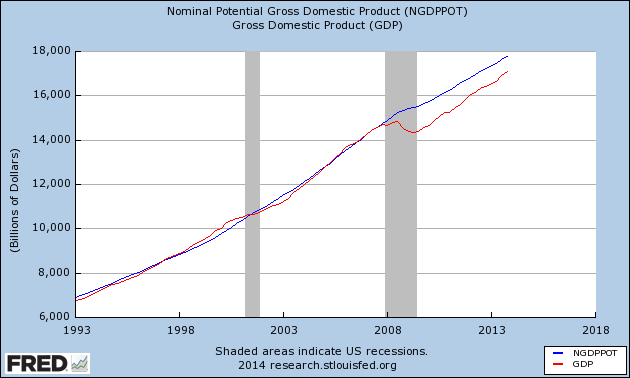No, the labor market isn't getting tight

A free daily email with the biggest news stories of the day – and the best features from TheWeek.com
You are now subscribed
Your newsletter sign-up was successful
Evan Soltas asks, "Is the labor market getting tight?"
He claims that the rising rate of workers quitting their jobs could show that the labor market is getting tighter. Workers quitting their jobs at a higher rate is taken as an expression of confidence. As Joe Weisenthal argues, "When the economy is bad, workers don't quit their jobs." The quit rate shows that the relationship between unemployment rate and quit-rates has remained steady, suggesting that it's the headline unemployment rate — which has now fallen to 6.6 percent — that best captures the state of the workforce.
Of course, what the rate of quits tells us is the rate of quits. People quit their jobs for all sorts of reasons, and even though the rate of quits is tightly correlated against unemployment, reading the rate of quits as a proxy for the tightness of the labor market is a risky extrapolation, and overlooks the bigger picture.
The Week
Escape your echo chamber. Get the facts behind the news, plus analysis from multiple perspectives.

Sign up for The Week's Free Newsletters
From our morning news briefing to a weekly Good News Newsletter, get the best of The Week delivered directly to your inbox.
From our morning news briefing to a weekly Good News Newsletter, get the best of The Week delivered directly to your inbox.
To assess the tightness of the labor market, we need a concept of the natural rate of unemployment. There is lots of argument over what we should mean by the "natural rate of unemployment," but the most popular definition is from Milton Friedman and Edmund Phelps, who defined it as the rate of unemployment consistent with output being at the "long-run" level. And what's very clear is that output is still in a big slump after 2008, way below its long-run trend:

[Federal Reserve Bank of St. Louis]
So even if we assume that the headline unemployment rate is the best measurement of tightness in the labor market, 6.6 percent (which translates to millions of people who want a job but can't find one) is still very slack because the economy is way below potential.
A free daily email with the biggest news stories of the day – and the best features from TheWeek.com
John Aziz is the economics and business correspondent at TheWeek.com. He is also an associate editor at Pieria.co.uk. Previously his work has appeared on Business Insider, Zero Hedge, and Noahpinion.
-
 The EU’s war on fast fashion
The EU’s war on fast fashionIn the Spotlight Bloc launches investigation into Shein over sale of weapons and ‘childlike’ sex dolls, alongside efforts to tax e-commerce giants and combat textile waste
-
 How to Get to Heaven from Belfast: a ‘highly entertaining ride’
How to Get to Heaven from Belfast: a ‘highly entertaining ride’The Week Recommends Mystery-comedy from the creator of Derry Girls should be ‘your new binge-watch’
-
 The 8 best TV shows of the 1960s
The 8 best TV shows of the 1960sThe standout shows of this decade take viewers from outer space to the Wild West
-
 Judge orders Washington slavery exhibit restored
Judge orders Washington slavery exhibit restoredSpeed Read The Trump administration took down displays about slavery at the President’s House Site in Philadelphia
-
 Hyatt chair joins growing list of Epstein files losers
Hyatt chair joins growing list of Epstein files losersSpeed Read Thomas Pritzker stepped down as executive chair of the Hyatt Hotels Corporation over his ties with Jeffrey Epstein and Ghislaine Maxwell
-
 Judge blocks Hegseth from punishing Kelly over video
Judge blocks Hegseth from punishing Kelly over videoSpeed Read Defense Secretary Pete Hegseth pushed for the senator to be demoted over a video in which he reminds military officials they should refuse illegal orders
-
 Trump’s EPA kills legal basis for federal climate policy
Trump’s EPA kills legal basis for federal climate policySpeed Read The government’s authority to regulate several planet-warming pollutants has been repealed
-
 House votes to end Trump’s Canada tariffs
House votes to end Trump’s Canada tariffsSpeed Read Six Republicans joined with Democrats to repeal the president’s tariffs
-
 Bondi, Democrats clash over Epstein in hearing
Bondi, Democrats clash over Epstein in hearingSpeed Read Attorney General Pam Bondi ignored survivors of convicted sex offender Jeffrey Epstein and demanded that Democrats apologize to Trump
-
 El Paso airspace closure tied to FAA-Pentagon standoff
El Paso airspace closure tied to FAA-Pentagon standoffSpeed Read The closure in the Texas border city stemmed from disagreements between the Federal Aviation Administration and Pentagon officials over drone-related tests
-
 Judge blocks Trump suit for Michigan voter rolls
Judge blocks Trump suit for Michigan voter rollsSpeed Read A Trump-appointed federal judge rejected the administration’s demand for voters’ personal data